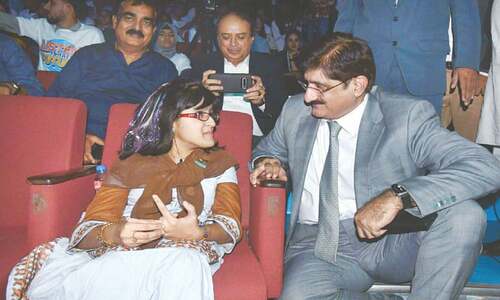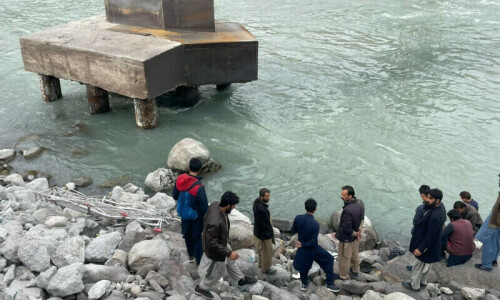KARACHI, Sept 19: While the National Assembly’s standing committee on health is unlikely to debate any time soon certain changes proposed in the Transplantation of Human Organs and Tissues Ordinance 2007, there is increasing anxiety on part of medical professionals and others, who urge the government to disallow the amendments since that, they maintain, would lead to exploitation and the trade of human organs.
Sources in the ministry of health said that the private bill was drafted by a group of National Assembly members, including Dr Azra Fazal Pechuho, Mrs Yasmeen Rehman and Mrs Shamshad Sattar Bachani.
It seeks the removal of some “lacunas of the ordinance in question and [to] make it more beneficial and worthy of use.” The sources added that the bill has been referred to the National Assembly’s 18-member standing committee, which includes two of the people who originally moved the amendment bill.
A Karachi member of the standing committee, Dr Nadeem Ahsan of the Muttahida Qaumi Movement, told Dawn on Thursday that the members of the committee had been named but that of the chairperson was still awaited. The health committee could only deliberate on the private members’ bill when it got a chairperson and became functional.
Dr Ahsan said that it would be premature for him to comment directly on the draft bill since he had not yet received it, although he had been apprised of its contents by one of his colleagues. “However,” he added, “I would like for positive activities related to organ transplants, particularly kidney transplants, to not receive any sort of set-back and would not like to hear Pakistan being referred to as a cheap human organs market.”
The draft bill calls for amendments in Sections 3, 4, 5 and 8 of the Human Organs and Tissues Ordinance 2007. It also seeks for the inclusion of half-brothers and -sisters in the list of persons allowed to donate a living organ.
Non-related donors and compensation
The draft bill states: “In case of the non-availability of a donor as explained under sub-section (1), and if there is a threat to the life of end-stage renal disease, liver, heart [or] lungs failure patients, the Evaluation Committee may allow donation by a non-blood relative or non-relative, after satisfying itself that such donation is voluntary. The donor under this section shall be compensated as may be prescribed.”
Conversely, Section 3(2) of the original 2007 ordinance states merely that: “In case of non-availability of a donor as explained under sub-section (1), the Evaluation Committee may allow donation by a non-close blood relative, after satisfying itself that such donation is voluntary.”
An amendment sought in Section 4(2) states:
“(2) Subject to sub-section (3), on the death of a donor making [the] authorisation referred to in sub-section (1), any close relative of the deceased authorised by him in the authorisation shall inform the Evaluation Committee about the deceased and cause the removal of the human organ or tissue in accordance with the will authorisation.
“(3) Where no person authorised in [the] will authorisation for causing removal of part of the human organ or tissue of the deceased or the person so authorised is not available for any reason whether temporarily or otherwise on the death of the deceased donor, the nearest blood relation who is in possession of the body of the deceased shall inform the Evaluation Committee.
“(4) A will donation under this section may be executed in such a form and manner as may be prescribed and may be revoked at any time during the lifetime of the donor making the will authorisation in the presence of two witnesses.”
The proposed amendment to Section 5 states:
“In the said ordinance, in Section 5, in sub-section (2), after paragraph (d), the following new paragraph shall be added, namely:
“(e) Determine compensation payable to a donor in case the recipient is not in a position to pay.””
Foreigners to be allowed organs
The proposed amendment to Section 7 has been drafted as follows:
“In the said ordinance, in Section 7, in sub-section (1), for the words ‘shall not be permissible to citizens of other countries’ occurring at the end, the words ‘be permissible to the citizens of other countries visiting Pakistan for medical purposes in emergency and only in limited number (10 per cent of the total number of transplantations performed by any hospital) as may be prescribed by the Evaluation Committee’ shall be substituted.”
The proposed amendments to Section 8 call for the president of the Society of Transplant Physicians and Surgeons of Pakistan to be included in the list of members of the Monitoring Authority, while the members of the above Monitoring Authority shall elect the chairperson from amongst themselves for a period of two years.
In the existing ordinance, the minister of health is supposed to be the chairman of the monitoring authority.
Referring to sub-section (3), (4) and (5) of Section 8, the draft bill proposes the following substitutions:
“(3) The Monitoring Authority shall appoint a secretary from the medical profession and also appoint such other officers that may be required, on terms and conditions to be determined by it, to carry out the day to day business of the Authority, for which the federal government shall provide [an] annual grant.
“(4) The amount of compensation payable to a donor shall be such as may be prescribed and shall be recovered from the recipient. For indigent patients, the federal government Monitoring Authority shall, by notification in the official Gazette, establish a fund consisting of grants by the federal and provincial government, contributions by NGOs, philanthropists and individuals.
“(5) The Evaluation Committee shall establish and regulate [a] pool of voluntary donors and registry of potential recipients as may be prescribed.” The original 2007 ordinance states in Section 8(4) that the federal government will, in consultation with the Monitoring Authority, establish a fund comprised of grants by the federal and provincial governments, and contributions by NGOs, and other individuals, to be used for the benefit of indigent patients.
‘Haven for organ-traders’
However Prof Dr Adibul Hasan Rizvi, surgical transplant specialist and director of the Sindh Institute of Urology and Transplantation, told Dawn that he had serious reservations about some of the changes proposed. “I fear that the mishandling of the existing ordinance may pave the way for the much-condemned practice of the sale of human organs, which is a highly unethical practice that increases the chances of the country’s poor being exploited,” he said. “The existing organ transplant laws cover the needs in all types of renal failure cases. Any breach could turn Pakistan into a haven for organ-traders.”











































Dear visitor, the comments section is undergoing an overhaul and will return soon.